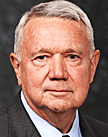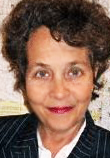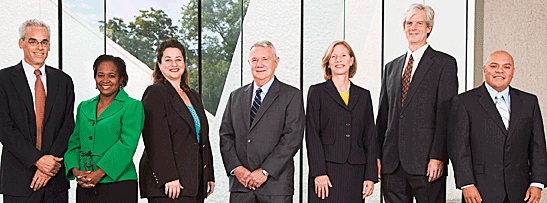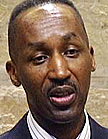Top Stories
Court halts $354 million development subsidy
Austin City Manager: Dallas discard vs Austin retread
Latest articles
Petition Imminent for Geographic Representation
for Geographic Representation in City Elections
Austinites for Fair Geographic Representation
to Promote 10-2-1 Plan for Council Elections
by Ken Martin
© The Austin Bulldog 2010
 Mayor Lee Leffingwell announced in his State of the City speech on February 25 that he wants to see a plan for increasing the size and geographic representation of the city council on the ballot in a November 2012 election.
Mayor Lee Leffingwell announced in his State of the City speech on February 25 that he wants to see a plan for increasing the size and geographic representation of the city council on the ballot in a November 2012 election.
The mayor’s proposal was only a day old when a group of Austin citizens—including liberals, conservatives and minorities—gathered at Huston-Tillotson University (HTU) to discuss forming a coalition to push its own plan through a petition drive that could get on the ballot this November.
Section 9.004 of the Texas Local Government Code sets the bar: the petition must be “signed by a number of qualified voters of the municipality equal to at least five percent of the number of qualified voters of the municipality or 20,000, whichever number is the smaller.”
A “test” petition drive is scheduled for this Saturday, March 12, from 12-2pm on the south steps of the State Capitol, during an expected big rally to protest the proposed budget cuts in state funding for education.
At the HTU meeting, the group adopted the name Austinites for Geographic Representation, and hopes to recruit volunteers to gather enough signatures to force the City Council to schedule the election.
If the proposition were to get on the ballot and be approved, it would change the electoral system specified in the City Charter. Article II, Section 1 of the Charter states: The council shall be composed of seven council members who shall ... be elected from the city at large. The meeting at HTU was organized by Linda Curtis, co-founder of ChangeAustin.org. She has led numerous petition drives to get measures on the ballot.
The meeting at HTU was organized by Linda Curtis, co-founder of ChangeAustin.org. She has led numerous petition drives to get measures on the ballot.
The program was moderated by Professor Michael Hirsch, PhD, chair of Social and Behavioral Sciences in HTU’s College of Arts and Sciences.
Only about 15 people attended the Saturday meeting, something Curtis said was intentional, so those who attended “could have a conversation.”
Attendees included Peck Young, director of the Center for Public Policy and Political Studies at Austin Community College, and a former political consultant for some four decades; Steve Aleman, president of the Austin Neighborhoods Council, a coalition of neighborhood groups; Steve Speir, a longtime Democratic activist and board member of the Better Austin Today Political Action Committee; Stacy Suits, deputy constable for Travis County Precinct 3; Roger Borgelt, vice president of the Travis County Republican Party; Roscoe Overton, an African American citizen with longtime interest in civil rights; and two candidates for Austin City Council: Chris Nielsen, who is running for Place 3 against incumbent Randi Shade, and Josiah James Ingalls, who’s running for Place 1 against incumbent Chris Riley.
What was discussed
Aide’s Smoking Gun E-mail
Advocated Evasion of Public Information Act
Provided Detailed Guide to Allow Chats with
Council Members on Dais But Leave No Trace
© The Austin Bulldog 2010
The Austin Bulldog has received copies of e-mails sent by Glen Coleman, policy aide to Council Member Randi Shade, that tells all the other council members’ executive assistants specifically how to disable the chat system’s ability to track the history of communications and sidestep the requirements of the Texas Public Information Act.
“In the heat of a council meeting, you may wish to communicate sensitive information that would not be appropriate for all of us to read in the (Austin American-) Statesman the next day,” Coleman stated in an e-mail at 9:22am July 8, 2009, addressed to all council executive assistants.
“For these situations, we use a chatting application called ‘Spark.’
“To set up Spark on your and your Council Member’s computers, please contact.... Once installed, be sure to disable the ‘chat history’ function.”
Coleman’s e-mail then informs the other aides how to disable Spark chat history—and delete all previous chat conversations—complete with screen shots and a step-by-step instructions.
Bulldog Files Lawsuit to Compel Compliance
Compel Compliance with the Law
Mayor and City Council Members Not in Compliance
with Statutes for Public Information, Records Retention
by Ken Martin
© The Austin Bulldog 2010

The Austin Bulldog electronically filed a lawsuit in state district court last night to sue the mayor and each council member in their individual capacity, and the City of Austin, for failure to promptly and fully respond to The Austin Bulldog’s requests filed under the Texas Public Information Act (TPIA), Chapter 552 of the Government Code.
The city’s decision to withhold certain government records—including records involving public business that were created or received on the mayor and council members’ cell phones or personal computers—lays bare a major problem preventing citizens from obtaining complete information about the affairs of government: To withhold records created or received on officeholders personal computers and cell phones is to effectively gut the Texas Public Information Act. To allow this to stand would amount to an open invitation for city officials and employees to conduct business in the shadows.
Withholding these public records from disclosure as requested by The Austin Bulldog on January 19, 2011, and January 27, 2011—and doing so without seeking an Attorney General’s opinion—only adds to the city’s previously reported problems in governmental transparency, evidenced by The Austin Bulldog’s story published January 25, which exposed the ongoing violations of the Texas Open Meetings Act, Chapter 551 of the Government Code.
Further, The Austin Bulldog’s lawsuit asserts there is evidence that one or more Austin officials deliberately use their private e-mail accounts to try to keep substantive communications about city business from being available through the city’s computer servers.
In one case, a council member asked a constituent to switch over to the council member’s personal e-mail address to continue discussing the controversial topic of tax subsidies for The Domain shopping center. This e-mail discussion obviously concerns important public business, as those subsidies amounted to anywhere from $25 million to more than $60 million, depending on whose figures you believe.
Records retention paramount
Spelman On the Record About Private Meetings
On the Record About Private Meetings
Fifth in a Series of Recorded
Question and Answer Interviews
by The Austin Bulldog
© The Austin Bulldog 2010
As reported by The Austin Bulldog January 25, County Attorney David Escamilla is conducting an inquiry about a complaint that the Austin City Council may have violated the Texas Open Meetings Act.
This is a serious matter and the city is taking it seriously. In lieu of the private meetings that for years have been held among the mayor and council members to discuss items on the Thursday council meeting agendas, the council is now holding work sessions to discuss the agenda in posted open meetings.
If the mayor and council members should be found to have in fact violated the Act, they may be subject to criminal prosecution under Section 551.143 of the Government Code, a misdemeanor punishable by a fine of not less than $100 or more than $500; confinement in the county jail for not less than one month or more than six months; or both the fine and confinement.
The Austin Bulldog is publishing selected text excerpts from each of the exclusive interviews conducted with the council members before breaking the story. The complete copyrighted MP3 audio file for each interview is linked at the bottom of each article for easy access. You may listen to these recordings to gain a better understanding of the published excepts within the context of the complete interview.
 Council Member Bill Spelman was interviewed in his office at City Hall on Monday, January 24, 2011. The recording runs 38 minutes 52 seconds.
Council Member Bill Spelman was interviewed in his office at City Hall on Monday, January 24, 2011. The recording runs 38 minutes 52 seconds.
The Austin Bulldog: I don't want to take too much of your time so let's jump right in. As I said in my e-mail requesting an interview I'm developing story about working relationships among the mayor and the council members and understanding how these folks work together to develop public policies. One thing that stands out of my mind is the four of you are pretty transparent on how you spend your time on council duties because you publish your calendars online.
Bill Spelman: Right.
The Austin Bulldog: Do you have any ideas about why (Mayor) Lee (Leffingwell), (Mayor Pro Tem) Mike (Martinez) and (Council Member) Sheryl (Cole) don't publish their calendars?
Work Sessions Stir Concern Over Tying Up Staff
Over Tying Up Staff for Two Meetings
City Manager Presents Summary of
Options for Council Consideration
© The Austin Bulldog 2011
 In the wake of the Austin City Council’s first work session in recent memory, held February 9, City Manager Marc Ott told the city council he was concerned about the new policy of conducting Wednesday work sessions in advance of the regular Thursday council meetings, where decisions are made and votes are cast.
In the wake of the Austin City Council’s first work session in recent memory, held February 9, City Manager Marc Ott told the city council he was concerned about the new policy of conducting Wednesday work sessions in advance of the regular Thursday council meetings, where decisions are made and votes are cast.
“It potentially has an adverse impact on productivity because we have so many people ... dedicated to two meetings,” KUT radio reported February 9.
The work sessions were reinstituted after Travis County Attorney David Escamilla announced on January 25 that he was conducting an inquiry in response to a complaint about possible violations of the Texas Open Meetings Act.
The mayor and council members have been reluctant to publicly state that the work sessions were instituted because of Escamilla’s inquiry—in spite of the fact the private meetings among the mayor and council members were immediately cancelled and the first work session was held the day before the next city council meeting.
 But Council Member Bill Spelman conceded as much in a February 9 interview with KUT radio: “That may have been the original genesis behind it (initiating work sessions) but I think anything which allows us to talk freely with one another is a good idea and leads to better decision-making on all of our parts,” he said.
But Council Member Bill Spelman conceded as much in a February 9 interview with KUT radio: “That may have been the original genesis behind it (initiating work sessions) but I think anything which allows us to talk freely with one another is a good idea and leads to better decision-making on all of our parts,” he said.
Mayor Lee Leffingwell described the work sessions like this: “It’s kind of like a pre-council meeting,” according to a February 10 report by KXAN-TV.
On February 10, the Austin American-Statesman reported that City Manager Ott asked during the work session whether the city’s department heads would have to spend every other Wednesday on call to answer council questions. Or should the council use the sessions to simply talk with one another—in lieu of the now-cancelled individual meetings.
After that meeting, Ott said he would bring his team together “and dissect what it is going to take for us to prepare ourselves for both a work session, study session, pre-Council meeting—whatever it ends up being called—as well as the regular Council meeting,” In Fact Daily reported February 10.
The council’s second work session is scheduled to begin at 1:30pm tomorrow, February 16, in the Boards and Commissions Room at City Hall, 301 W. Second St. The agenda includes an item for discussion and possible action on work session procedures. No action will be taken and there will be no citizen participation during the work session. Citizens will be permitted to address agenda items at the regularly scheduled City Council meeting on Thursday, February 17, 2011.
Larry Schooler, the city’s community engagement consultant, said in an interview with KUT radio on February 9 that the city council had asked for a review of “best practices” in other cities and had gotten a memo from the city manager that outlines a number of different ways that other city councils elsewhere in the country discuss their agendas prior to a public vote and public comment. “This is going to have to be a work in progress,” Schooler said.
Possible meeting options
Investigative Reports
For more than a decade the Bulldog has published hard-hitting, in-depth investigative reports that have shaped civic discourse and public policy, resulted in criminal prosecutions, and enlightened voters about candidates' records. Here are a few samples of our work:
About us
The Austin Bulldog is the premiere investigative journalism outfit in Central Texas. Established in 2009, the Bulldog has become a trusted independent voice for government accountability, known for its incisive, in-depth coverage of local elections and local governments.
Newsletter
Keep up with the best investigative reporting in Austin.
Follow us
Bulldog Team
Ken Martin
Founder and EditorOur critical accountability journalism wouldn't be possible without the generous donations of hundreds of Austinites. Join them and become a supporter today!
Areas of Coverage
Austin City Manager: Dallas discard vs Austin retread
Lame duck council set to vote on 20-year sweetheart tax deal for developer
Environmentalists assail plan for lakeside high rises
Urbanists vie to replace council member Kathie Tovo
First-ever opportunity to elect appraisal board members
District 10 Council candidates jump in early
Announcing the Government Accountability Project
Central Health launches search for new CEO
First-ever opportunity to elect appraisal board members
Announcing the Government Accountability Project
Project Connect
Lawmakers weigh axing Project Connect’s ‘blank check’ loophole
Project Connect scope drastically scaled back
Austin Transit Partnership gears up for key decisions on light rail design
Become a Bulldog supporter
The Bulldog is funded by its readers. We're not affiliated with any political party or interest group. We're not paid by corporate sponsors. Support us today so we can continue to be a trusted voice for government accountability.







